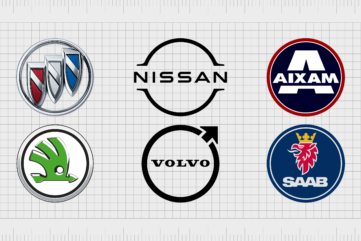What are historical brand names? Exploring the historical business name

Historical brand names are one of the many unique types of monikers companies can use to identify and distinguish their organization. No matter the industry or location, the name of a business will always influence how successful a venture might be.
Consumers don’t just use brand names to differentiate between companies; they also use the titles companies choose to gain insight into their values, history, and mission. Because of this, each naming strategy can generate different outcomes and opportunities for an organization.
A descriptive name tells an audience precisely what they can expect from the business regarding services or products. An inventive name is creative and evocative, ideal for showing the underlying personality of a brand.
On the other hand, a historical brand name tells us something about the company’s origins and how they approach the business world.
Like all types of naming strategies, choosing historical company names can positively and negatively affect an organization. Today, we’re going to take a closer look at the origins of historical names and what they can do for a brand.
What is a historical brand name?
So, what are historical brand names? Essentially, they’re titles concerning the “origins” of a business. In some cases, historical names are similar to founder business names, as they can frequently reference the people or persons responsible for building a company.
Historical names may also reference a specific historical figure, who inspires the particular values, personality, or core focus of the brand. As such, Tesla is named after one of the best-known individuals in the electricity landscape.
By referencing Tesla in its brand name, the company connects itself to a lifelong pursuit of electrical innovation.
Origin or historical brand names can also reference other components of a company’s background, such as a critical inventor responsible for creating the tools the business uses or even a location.
Overall, the core focus of this kind of naming is to differentiate the company and give it a clear link to the past. The titles show consumers and partners where the entity came from and where it’s going.
Historical brand names can have significantly more meaning and depth than other naming strategies. While a descriptive title tells customers only what the business does now, a historical name shares the inspiration and motivation of the company.
It can be both evocative and inspiring. In some cases, it’s even capable of giving the organization the foundations it needs to be identified as a “legacy brand.”
What are the pros of historical brand names?
While most companies focus heavily on the future when choosing brand names, giving a company a historical name can have its own unique benefits. According to studies, consumers are naturally more likely to trust brands with a sense of heritage.
Research finds that around 8 in 10 adults are more likely to find “legacy” brands, or those with a long-standing in the industry, to be more credible.
While modern and innovative brands are seen as creative and exciting, historical companies are stable and reliable. They’ve already proven themselves in the business landscape in the eyes of their consumers.
Brands with links to history can also benefit from using nostalgic storylines and imagery in their branding and advertising. According to the above report, more than 6 in 10 respondents say nostalgic components are more likely to convince them to interact with a business.
Some of the most significant benefits of using historical brand names include the following:
Stability
Companies using a historical brand name are connected with a longer standing in their industry or sector. The longer a company is perceived to have existed in its space, the more likely it is to gain the trust of its audience.
Consumers like purchasing from brands that appear to be strong, reliable, and sturdy.
Nostalgia
Historical brand names don’t just remind us of the general past; they also help us to connect with our own personal history. Names referencing historical figures are a great way to make us reflect on our education throughout the years.
Around 7 in 10 adults say they’ve purchased an item they consider “nostalgic” over the years.
Meaning
Linking a business to a historical figure or location gives it a specific story. This story can convey essential details about a brand, its values, and its personality.
Just look at Tesla. The name makes us think of people with innovative minds, ready to push the boundaries of science in search of something new.
Differentiation
Historical brand names are often easier to “own” than other titles because they’re rarely used in the branding space. This is particularly true when companies use the name of their own specific founders or inventors in their titles.
It’s unlikely for two founders to have the exact same name, so there’s room for differentiation.
Humanity
Linking a brand name to a specific person, whether a founder or historical figure, is a great way to connect with the concept of humanity overall. We’re more likely to feel emotional connections with real people than we are with technology, features, or concepts.
This can strengthen a company’s emotional bond with its prospects.
What are the cons of a historical name?
Historical company names and “origin” titles can have a lot of benefits when used correctly. They help to tie a business to an important concept and give them a sense of historical depth. However, historical business names have their challenges.
Perhaps the most considerable risk for companies in specific industries is a historical name may cause a company to appear “old-fashioned.”
In sectors where innovation and creativity are critical, like technology, many businesses prefer to choose names that highlight their focus on the future rather than the past.
Younger audiences are typically less likely to be affected by things like history and nostalgia, so that a historical brand name could isolate a portion of your audience.
It’s also worth noting that linking your company to a specific location, entity, inventor, or person can have certain dangers.
Even using the historical names of famous people can become a liability for a brand, as new perspectives can emerge about a person’s behavior, making them a more controversial figure the more we learn about them.
Some of the most significant downsides of historical brand names include:
Old fashioned
As mentioned above, younger audiences and customers focused on the future can see historical names as old-fashioned and outdated. Rather than making your company appear solid and stable, some names could make a brand seem obsolete.
It’s vital to ensure a name still has the ability to thrive in the future.
Changing perceptions
Present-day sensitivities and changing attitudes towards historical figures and locations can turn history’s heroes into villains in contemporary space. This could mean a historical identity gradually becomes a liability for a brand. Countless historical figures have had their actions questioned in recent years.
Confusion
Linking a company to a specific person, whether a founder, inventor or historical individual, can make it difficult to define what the business does. Not everyone will know the stories of the people connected with a brand. If customers don’t have a clear insight into the origins of a name, this can lead to confusion.
Audience alienation
Some people are more naturally drawn to historical names than others. For companies hoping to elicit a sense of nostalgia, a historical name may appeal to an older audience, but alienate younger customers. This is why it’s crucial to know your customers before you choose any specific name.
Creativity
Some historical names, particularly those linked to founders and inventors, are often seen as less creative and inventive than different titles. This could make your business appear dull and less appealing to some customers. It’s essential to showcase your unique personality in your brand name.
Famous historical brand names (examples)
Historical brand names are an excellent tool for giving a business depth, background, and meaning in some cases. Used correctly, these monikers can be a perfect way for companies to demonstrate their stability in an industry and connect themselves to unique origin stories.
However, like any naming strategy, businesses must think carefully about the messages they want to send to their target audience. If you’re considering choosing historical business names for your company, the following examples of famous brands could inspire you.
Tesla
Perhaps the most famous example of a historical brand name today, Tesla is named after the renowned inventor and electrical innovator, Nikola Tesla. The company launched originally in 2003 with a vision of bringing solar-powered devices and electric vehicles to the masses.
Today, the company uses various elements of Tesla’s incredible inventive history in its branding and even bases its logo on one of his creations.
By connecting with such a well-known historical figure, Tesla sets itself apart as a creative and imaginative company, with a background in the origins of electrical discovery.
Trojan
The Trojan name belongs to a company known for producing a range of sexual health products such as condoms and lubricants.
First launched in 1916, the company chose its unique name to reference the famous Trojan people, who intelligently hid within a giant wooden horse to gain entrance to a city for an attack.
It’s an unusual name, but it has also appeared in several different instances over the years. The word Trojan is even used in reference to a specific type of computer virus today. The idea for the company was to connect itself with a history of innovation and strength.
Nike
One of the better-known companies in the American apparel landscape, Nike first launched in 1964 under the name Blue Ribbon Sports. Eventually, the organization chose to change its name to a reference to a goddess from Greek history.
Nike is the Goddess of Victory, best known for speed, excellence, and success. Although she wasn’t an actual historical figure, her story is well-known today, giving Nike a unique personality and significant meaning in its title.
DHL
DHL is both a historical name and an acronym. At first, it may not mean much, but the name chosen for the company launched in 1969 is actually a historical reference. Each of the letters corresponds with a surname for the company’s three founders.
The company is named after Adrian Daisley, Larry Hillblom, and Robert Lyn. This is an interesting title as it helps to demonstrate the unique background of the business and where it originally began.
Although the company has evolved drastically over the years and is no longer led by the founders, it has retained its historical brand name.
McDonald’s
Easily the most popular and successful fast-food restaurant in the world today, the McDonald’s corporation was first launched in 1940 by a pair of innovative brothers.
Richard and Maurice McDonald started from nothing, opening a single hamburger stand before eventually converting their idea into a franchise.
The name of the McDonald’s company is a historical reference to the beginnings of the company and the two incredible people who made the world’s largest burger restaurant a reality.
Today, the company is the world’s second-largest employer and the ninth-largest brand according to global valuations and sales.
Adidas
Another sporting apparel company with a historical brand name, Adidas was originally launched in 1924 and is one of the biggest companies in the world today. Over the years, many people have speculated on what the business title might mean.
However, statements from the brand tell us it’s a reference to the founder, Adolf Dassler.
The name Adidas is a portmanteau of the two names of Adolf Dassler. The first part, “Adi,” is the nickname he frequently used with friends. The “Das” comes from the first three letters of his surname. This is a fantastic historical company name because it’s also inventive and unique.
Starbucks
Launched in 1971, Starbucks is the world’s largest coffeehouse chain. The organization has more than 33 thousand stores across 80 countries. Interestingly, the name of the business was chosen because Terry Heckler decided the letters “St” at the beginning of a name were powerful.
Eventually, the brand started looking at the name “Starbo,” a mining town in the Cascade Range.
They also remembered “Starbuck,” the name for a chief mate in the book Moby Dick. While Moby Dick doesn’t have anything to do with the company, the historical name gives the organization a sense of heritage and history.
Johnson & Johnson
Launched in 1886, Johnson & Johnson is a multinational corporation responsible for developing a range of consumer-packaged goods, medical devices, and pharmaceuticals. One of the world’s most valuable companies today, the brand was named specifically after its founders.
Robert Wood Johnson, James Wood Johnson, and Edward Mead Johnson were all responsible for bringing this organization to life. It isn’t easy to know for sure why the company chose only two Johnsons for its name.
Perhaps, however, this was an attempt to make the title seem shorter, more concise, and, therefore, more memorable.
John Deere
Otherwise known as Deere & Company, John Deere is an American company best known for manufacturing heavy equipment, agricultural machinery, and various other items.
The company initially launched in 1837 and has maintained its title, along with a logo that includes the image of a leaping deer.
The John Deere name comes from the brand’s founder, making it both an etymological title and a historical brand name. The Deere name works well because John Deere was also a famous inventor at the time, helping to link the organization to concepts of innovation and discovery.
Yakult
Like John Deer, Yakult is a unique company with a founder-based name. This Japanese probiotic milk beverage is sold in convenience stores worldwide. First launched in 1935, the company chose the name of its original inventor and founder for its title.
The name Yakult has proven to be very successful for the brand, in part because it’s so unique and unlike anything else on the market. The name Yakult is also considered to be derived from the Japanese word for Yogurt.
The North Face
The North Face is one of the few examples of historical brand names which reference a specific location rather than a person. The company, which specializes in selling outdoor clothing and recreational products, launched in 1968, with a name chosen to reference its unique selling point.
The brand chose the name “The North Face” in reference to the coldest side of the mountain, with the most treacherous terrain. The founders believed referencing this specific side of the mountain was an excellent way to highlight the ability of its products to help customers overcome any challenge.
How to choose historical company names
Historical company names can be an excellent way for businesses to demonstrate their heritage and origins while capturing the attention of their target audience.
Chosen with the right degree of care and caution, these titles can set organizations up to become “legacy brands” capable of attracting the trust and loyalty of their target customers.
However, like any naming process, it’s essential to follow a few key steps for success. Here are a few tips to get you started:
Examine your brand
Start by looking closely at your brand, the personality you want to create, and the origins of your company.
What key elements can you convey in your name to help capture the attention of your target audience? What sort of names might make you appear more credible or trustworthy?
Research
Make sure you understand not just your target audience but the broader market.
Some consumers see historical names as trustworthy, while others consider them outdated and boring. It’s essential to have a clear view of your customers and their perceptions before you begin the naming process.
Check for issues
As mentioned above, people’s perceptions of historical figures and locations can vary over time. It’s also worth noting that different consumers will respond to historical terms differently, depending on where they are in the world.
Make sure you do your due diligence to avoid any potential issues.
Keep it simple
A historical name should be clear, simple, and easy to spell. Make sure your customers can easily remember whatever your title might be and stay away from any extremely lengthy names. If your title seems too confusing, it could alienate your target audience.
Make sure the historical reference makes sense to all customers too.
If you’re struggling with choosing a historical brand name, consider working with a professional naming agency. They can do the research and due diligence on your behalf to ensure your title hits the right notes with your target audience.
Exploring historical brand names
Like any naming strategy, choosing historical brand names for your company can have both pros and cons.
On the one hand, a historical brand name is a phenomenal way to give your company a sense of heritage and connect with your customers emotionally. It can make your brand more credible, nostalgic, or knowledgeable.
On the other, historical business names can sometimes alienate younger audiences and lead to confusion. There’s also the risk your name may eventually lose some of its impact if the historical location, figure, or individual you choose starts to be viewed differently by the public.
Make sure you research your options carefully and choose a unique name that can leave a powerful impression on your customers.
Fabrik: A naming agency for our times.

We’ve made our name famous by naming other businesses.
Get in touch if you have a company, product, or service that requires a unique name. Click below, and let’s start a conversation today!
Now read these:
—Types of brand names, the ultimate guide
—An in-depth guide to descriptive brand names
—The pros and cons of abstract brand names
—When to use an evocative brand name
—Your guide to invented company names
—Is a lexical brand name right for your business?
—An insight into acronymic business names
—Putting geographic brand names on the map
—Should you name a business after yourself?
—Definitive guide to compound brand names
—Exploring the trend for modern brands names
—Is a playful business name right for you?
—Adding up alphanumeric company names
—Why are metaphorical brand names popular?
—Weighing up technical company names































